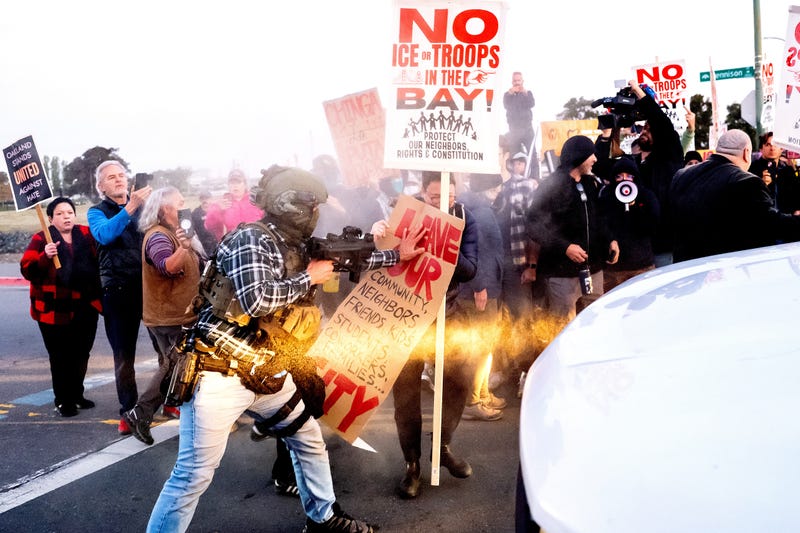
ALAMEDA, Calif. (AP) — President Donald Trump said Thursday that he’s backing off a planned surge of federal agents into San Francisco to quell crime after speaking to the mayor and several prominent business leaders who said they're working hard to clean up the city.
Trump had been threatening to send the National Guard to San Francisco, a move Mayor Daniel Lurie and Gov. Gavin Newsom said was unnecessary because crime is on the decline. Separately, U.S. Customs and Border Protection agents began arriving at a Coast Guard base in the region earlier Thursday for a possible ramp up of immigration enforcement, a move that drew several hundred protesters.
It was not clear if the president was canceling a National Guard deployment or calling off immigration enforcement by CBP agents. At his news conference, Lurie said he could not clarify and could only repeat what the president had told him. Lurie said Homeland Security Secretary Kristi Noem “reaffirmed" Trump's commitment on Thursday morning. DHS oversees CBP agents as well as U.S. Immigration and Customs Enforcement.
“The Federal Government was preparing to ‘surge’ San Francisco, California, on Saturday, but friends of mine who live in the area called last night to ask me not to go forward with the surge," Trump posted on social media. “I spoke to Mayor Lurie last night and he asked, very nicely, that I give him a chance to see if he can turn it around.”
Specifically, Trump said he heard from Salesforce CEO Mark Benioff and Nvidia CEO Jensen Huang. He said the federal government could handle crime better than city leaders, and he indicated he could still send agents in the future.
At an afternoon news conference, Lurie said he welcomes the city’s “continued partnership” with the Drug Enforcement Agency and other federal authorities to get illegal narcotics off the streets and contribute to San Francisco’s falling crime rates.
“But having the military and militarized immigration enforcement in our city will hinder our recovery,” the mayor said. Trump’s assertions of out-of-control crime in the city of roughly 830,000 have baffled local and state leaders, who point to statistics showing that many crimes are at record lows.
Newsom’s office said on X: “Trump has finally, for once, listened to reason — and heard what we have been saying from the beginning. The Bay Area is a shining example of what makes California so special, and any attempt to erode our progress would damage the work we’ve done.”
Protesters assembled just after dawn at Coast Guard Island in Alameda, California, where CBP agents were arriving before Trump made his remarks. Several hundred people stood outside the facility, with many singing hymns and carrying signs saying, “Protect our neighbors” and “No ICE or troops in the Bay."
Police used at least one flash-bang grenade to clear a handful of demonstrators from the entrance as CBP vehicles drove onto the base. Organizers urged protesters to remain peaceful, as a line of Coast Guard officers in helmets watched from just outside the entrance.
Protester Gala King participated in an interfaith vigil against the federal crackdown and in support of immigrants.
“The Bay Area is a beautiful place full of diversity, and we are here to protect that,” King said. “Our faith traditions, our interfaith traditions, call on us to stand on the side of justice, to stand on the side of those that are most marginalized, that are most targeted right now."
Coast Guard Island is an artificial island formed in 1913, and the Coast Guard first established a base there in 1926. The island is owned by the federal government and is not open to the general public, so escorts or specific government ID cards are required for visitors. The Coast Guard is part of the Department of Homeland Security.
Trump has deployed the Guard to Washington, D.C., and Memphis, Tennessee, to help fight what he says is rampant crime. Los Angeles was the first city where Trump deployed the Guard, arguing it was necessary to protect federal buildings and agents as protesters fought back against immigration arrests.
He has also said they are needed in Chicago and Portland, Oregon. Lawsuits from Democratic officials in both cities have so far blocked troops from going onto city streets.
___
Weber reported from Los Angeles. Associated Press journalists Jonathan Mattise in Nashville, Tennessee, and Janie Har in San Francisco contributed.